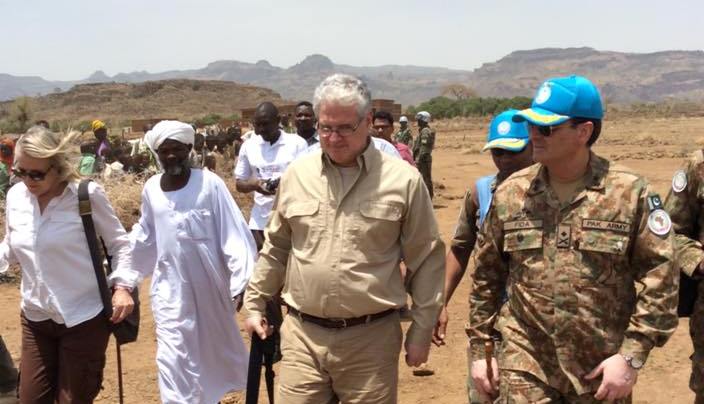Washington says Khartoum “took credible steps towards peace”
July 5, 2017 (KHARTOUM) – The U.S. Chargé d’Affaires to Khartoum Steven Koutsis has refrained from speculating on President Donald Trump’s awaited decision regarding the permanent lift of sanctions on Sudan saying relation with Khartoum is growing.

The five-track process includes the fight against terrorism, Uganda’s Lord’s Resistance Army (LRA), Sudan’s role in the peace process in South Sudan, Sudan’s peace and the humanitarian situation in the South Kordofan and Blue Nile states.
“Progress in our relations is real and we want that positive momentum to continue.
Sudan has shown it is a willing partner in resolving regional issues and has taken credible steps toward peace” said Koutsis in his Independence Day remarks on Tuesday
The U.S. diplomat added the “United States and Sudan have a relationship that will continue to grow, mature, and bring tangible, positive results for both of our peoples”, saying there is a “clear path to peace” in Sudan.
“It is facilitated by the African Union, with many international partners, including the United States, ready to support those efforts” he pointed out
HUMANITARIAN ACCESS
Koutsis reiterated the call to the Sudan People’s Liberation Movement/North (SPLM-N) to accept the U.S. proposal to deliver humanitarian assistance to the affected population in the war zones, and “to test the Government’s commitment by returning to negotiations for peace”.
The Sudanese army has been fighting the SPLM-N in the South Kordofan and Blue Nile states, also known as the Two Areas since 2011.
Talks between the two sides for a cessation of hostilities and humanitarian access under the auspices of the African Union High Implementation Panel (AUHIP) are stalled since last August. The SPLM-N demands to deliver 20% of the humanitarian assistance through a humanitarian corridor from Asosa, an Ethiopian border town.
But the government rejects the idea saying it is a breach of the state sovereignty and a manoeuvre from the rebels to bring arms and ammunition to their locked rebel-held areas in the Two Areas.
The SPLM-N last November declined an American proposal to transport humanitarian medical assistance directly to the civilians in the rebel-held areas in the Blue Nile and South Kordofan.
NATIONAL DIALOGUE
The U.S. Chargé d’Affaires called on the Sudanese government to “keep open the possibility of an inclusive political dialogue”
“This will require the government to allow activists, students, and journalists to express views that differ from those held by the government without fear of imprisonment” he said
“All voices are needed for Sudan to move towards a more progressive future, creating a government of institutions that respects human rights based on justice and the rule of law, and allows all Sudanese to practice their faith freely and without harassment” he added
Since January 2014, Sudan’s President Omer al-Bashir has been leading a national dialogue process whose stated aims are to resolve the armed conflicts, achieve political freedoms, alleviate poverty and the economic crisis, and address the national identity crisis.
Last October, the political forces participating in the national dialogue concluded the process by signing the National Document which includes the general features of a future constitution to be finalised by transitional institutions.
The opposition groups boycotted the process because the government didn’t agree to a humanitarian truce with the armed groups and due to its refusal to implement a number of confidence building measures aiming to create a conducive environment in the country before to hold the inclusive dialogue.
DARFUR PEACE
Regarding the situation in Darfur region, the American diplomat said “we have never been closer to achieving peace in Darfur”.
“The first order of business would be to create the means for those Darfuri armed groups to return in a safe and coordinated manner so they can join in the Darfur peace process” he said
He added that the holdout groups must “accept that a political solution is the only way forward”, urging the government and the armed groups “to be forward leaning in reinvigorating this process”
“In this regard, the United States welcomes the Government of Sudan’s decision to extend its unilateral cessation of hostilities throughout the conflict areas in order to give more time for the armed groups to enter into the peace process” he said
It is noteworthy that the Sudan Liberation Movement (SLM-MM) led by Minni Minnawi and the Justice and Equality Movement (JEM) are participating in the AU-brokered peace process.
However, the process is stalled over the Doha Document for Peace in Darfur as the government says it should be the basis of the talks and the two groups demand a new framework agreement for peace in the western Sudan region.
Koutsis also welcomed the “improvements to date to serve the urgent needs of the more than two million displaced Sudanese in Darfur and hundreds of thousands of others in Blue Nile and South Kordofan”, saying humanitarian access has been one of our most difficult challenges in the Five Track Engagement Plan process.
Last month, the African Union and the UN Security Council decided to change the mandate of African Union-United Nations Hybrid Operation in Darfur (UNAMID) and to reduce by a half its troops, citing improvement of the security situation in the region.
The Sudanese army has been fighting a group of armed movements in Darfur since 2003. UN agencies estimate that over 300,000 people were killed in the conflict and over 2.5 million were displaced.
